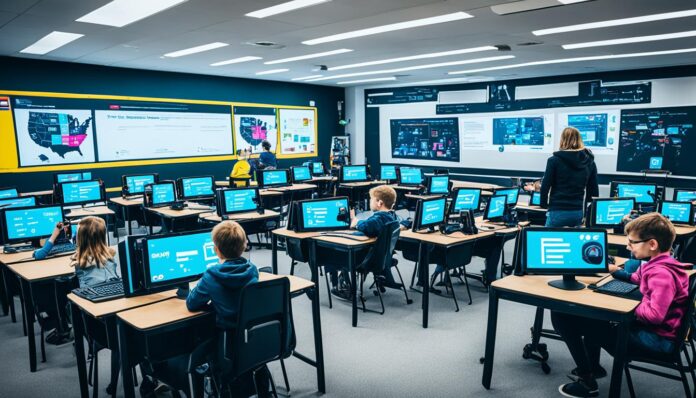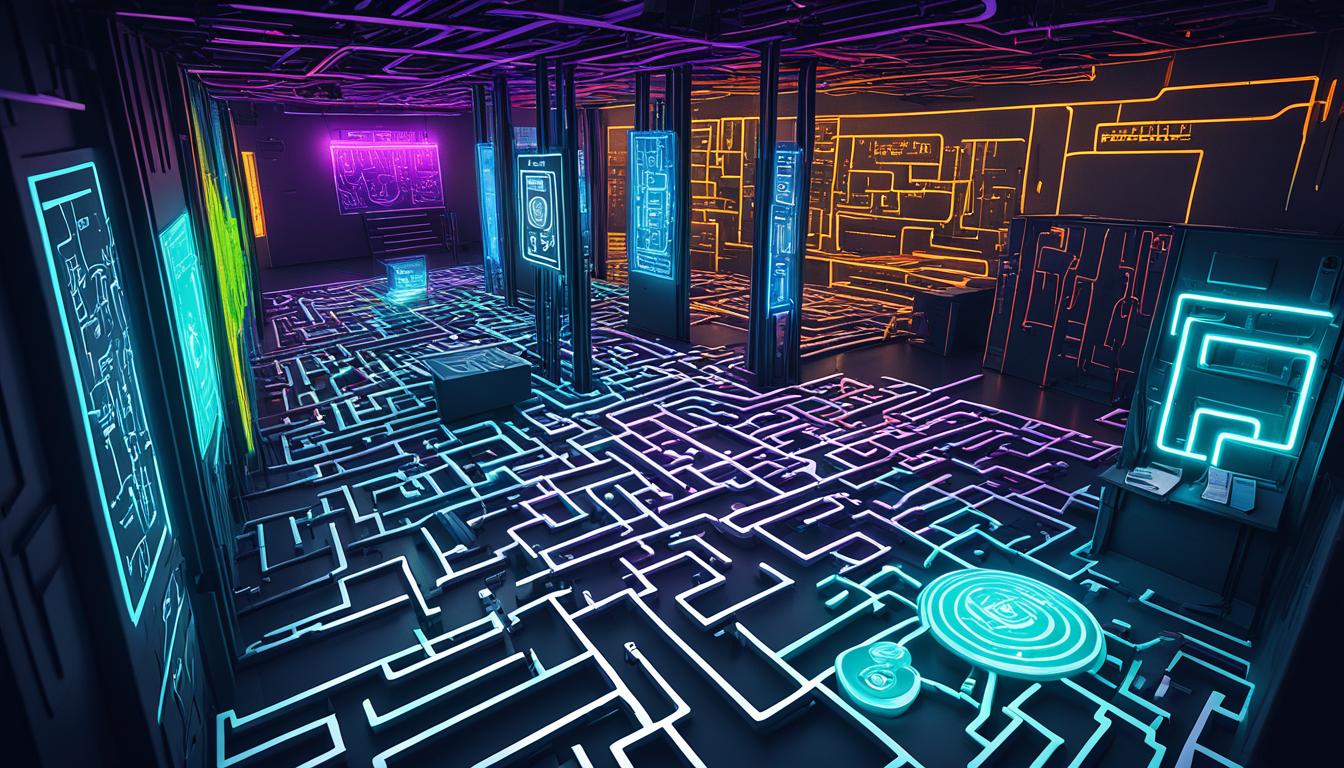
Artificial Intelligence (AI) is a rapidly developing technology that has the potential to transform education globally. It can enhance learning outcomes, reduce barriers to access, and foster innovation and inclusion in education. However, AI also poses significant challenges and risks that require careful consideration and regulation. AI is not a threat but a partner and catalyst that can enhance human capacities and empower human rights. It can make education more accessible, engaging, and effective for everyone, everywhere. This is the promise of AI for education.
Key Takeaways
- AI-driven personalized learning has the potential to transform education by 2025.
- Adaptive learning technologies, intelligent tutoring systems, and AI-powered learning analytics are driving the rise of AI in education.
- Personalized learning paths and customized learning experiences can improve student outcomes and engagement.
- Virtual assistants, chatbots, AI-enabled collaboration, and simulations will shape the future of AI in education.
- Responsible and conscientious use of AI in education is crucial to promote ethical and positive change.
The Rise of AI in Education
Artificial Intelligence (AI) is rapidly transforming the education landscape, offering new possibilities for personalized learning, adaptive technologies, and data-driven insights. As the concept of AI dates back to the 1950s, the recent advancements in “generative AI” have taken the world by storm, with this cutting-edge technology being integrated into software across various fields, including the realm of education.
Adaptive Learning Technologies
Adaptive learning technologies powered by AI algorithms can tailor educational content and experiences to the unique needs and learning styles of each student. These systems continuously analyze student data, including performance, engagement, and progress, to dynamically adjust the pace, difficulty, and delivery of the learning materials. By providing personalized learning paths, adaptive learning technologies can enhance student outcomes and foster a more engaging and effective educational experience.
Intelligent Tutoring Systems
Intelligent tutoring systems (ITS) are AI-driven applications that can provide real-time, personalized guidance and feedback to students, mimicking the role of a human tutor. These systems leverage natural language processing, machine learning, and cognitive science to understand the student’s knowledge gaps, learning preferences, and problem-solving strategies. ITS can offer immediate support, targeted interventions, and adaptive explanations, empowering students to learn at their own pace and maximize their learning potential.
AI-Powered Learning Analytics
AI-powered learning analytics harness the power of data-driven insights to inform and improve educational practices. By analyzing vast amounts of student data, including attendance, engagement, assessment results, and learning patterns, AI-based analytics can provide educators with valuable insights to identify areas for improvement, tailor instructional methods, and develop more effective curricula. These data-driven insights can lead to personalized learning paths, targeted interventions, and data-driven decision-making that enhances the overall quality of education.
Personalized Learning Paths
As the education landscape evolves, AI-driven personalized learning is emerging as a transformative force. Supporters of this technology, both within and outside of higher education, highlight its potential to serve the global population of students more equitably. One of the key benefits of AI-driven personalized learning is the ability to customize learning experiences based on individual student needs.
Customized Learning Experiences
AI-powered tools can analyze student data and provide real-time feedback and support to create adaptive learning paths that adjust based on each student’s progress and areas of weakness. This personalized approach allows learners to progress at their own pace, focusing on the areas they need the most assistance with. By tailoring the learning experience, AI can help students overcome challenges and achieve their full potential.
Adaptive Learning Paths
The integration of adaptive learning technologies, intelligent tutoring systems, and AI-powered learning analytics enables the creation of personalized learning paths. These adaptive learning paths dynamically adjust to the individual’s needs, providing a more engaging and effective educational experience. As students navigate through the curriculum, the AI-driven system continuously monitors their performance and adjusts the learning materials, pace, and activities to ensure they are challenged appropriately and make steady progress.
The promise of AI-driven personalized learning lies in its ability to revolutionize the way we approach education, fostering a more data-driven and personalized approach to education technology trends and the future of AI in education. By empowering students with customized learning experiences and adaptive pathways, we can unlock new possibilities for student success and drive meaningful change in the education landscape by 2025 and beyond.

How will AI-driven personalized learning change education by 2025?
As we look towards the future of education, the integration of AI-driven personalized learning is set to have a transformative impact. By 2025, virtual assistants and chatbots will become increasingly prevalent, providing real-time support and answers to student questions. These AI-powered tools will revolutionize the learning experience, offering personalized guidance and support tailored to each student’s unique needs.
Virtual Assistants and Chatbots
Intelligent virtual assistants and chatbots will become an integral part of the educational landscape, empowering students with on-demand access to information and support. These AI-powered systems will use natural language processing and machine learning to understand student queries, provide personalized responses, and offer guidance on a wide range of topics. This will not only improve the efficiency of learning but also foster a more engaging and interactive educational experience.
AI-Enabled Collaboration and Simulations
In addition to virtual assistants and chatbots, AI-enabled collaboration and simulations will transform the way students learn and engage with course material. AI-powered tools will facilitate seamless teamwork, allowing students to collaborate on projects, share ideas, and receive real-time feedback. Furthermore, AI-driven simulations will create immersive learning environments, enabling students to apply their knowledge and skills in practical, risk-free scenarios. These innovative approaches will not only enhance understanding but also prepare students for the challenges they may face in the real world.
Curriculum Development and Assessment
Beyond the classroom experience, AI will also play a significant role in curriculum development and assessment. AI-powered learning analytics will provide educators with valuable insights into student performance, learning patterns, and areas for improvement. This data-driven approach will enable personalized learning paths, tailored lesson plans, and adaptive assessment strategies that cater to the unique needs of each student. As a result, educators will be better equipped to design and deliver curricula that maximize student engagement, learning outcomes, and academic success.
As AI-driven personalized learning continues to evolve, the future of education promises to be more responsive, engaging, and effective than ever before. By embracing these innovative technologies, we can create learning environments that empower students, foster collaboration, and drive academic excellence.
Conclusion
In conclusion, the transformative power of AI technology is reshaping the landscape of education and reskilling. This innovative approach offers unprecedented opportunities for personalized learning, real-time feedback, and adaptive learning paths. By leveraging AI-powered tools, you can create more efficient and effective learning environments that cater to the diverse needs of learners and organizations.
However, it is crucial to approach the integration of AI in education and reskilling with responsibility and thoughtfulness. We must be mindful of the ethical implications and promote a culture of continuous learning. As educators and trainers, you hold the power to shape the future of learning and reskilling by embracing the potential of AI technology and using it to drive positive change.
The future of education is bright, with AI serving as a catalyst for personalized, data-driven, and adaptive learning experiences. By harnessing the capabilities of this transformative technology, you can empower learners, foster innovation, and create a more equitable and accessible educational landscape. Embrace the possibilities, navigate the challenges, and be a trailblazer in the AI-driven evolution of education and reskilling.
FAQ
What is the potential of AI-driven personalized learning in education?
AI has the potential to transform education globally by enhancing learning outcomes, reducing barriers to access, and fostering innovation and inclusion. AI-powered tools can analyze student data to provide customized learning experiences and adaptive learning paths that adjust based on individual student needs and progress.
How has the rise of “generative AI” impacted the education sector?
The emergence of “generative AI” – which can spontaneously create text, images, and video in response to user prompts – has been rapidly infused into software for virtually every field, including education. Generative AI is now being used to develop virtual assistants, chatbots, and interactive learning environments.
What are some of the key benefits of AI-driven personalized learning?
One of the key benefits of AI-driven personalized learning is the ability to customize learning experiences based on individual student needs. AI-powered tools can analyze student data to provide real-time feedback, support, and create adaptive learning paths that adjust based on student progress and areas of weakness.
How will AI-driven personalized learning change education by 2025?
By 2025, AI-driven personalized learning is expected to have a profound impact on education. Virtual assistants and chatbots will provide real-time support and answers to student questions, while AI-enabled collaboration and simulations will enhance the learning experience, allowing students to engage in interactive and immersive learning environments.
What are the ethical considerations in using AI in education?
While AI technology offers significant opportunities in education, it also poses challenges and risks that require careful consideration and regulation. As educators and trainers, we must approach the use of AI in education in a responsible and conscientious manner, being mindful of ethical implications and promoting a culture of continuous learning.
